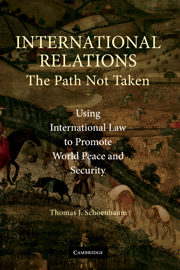Book contents
- Frontmatter
- Contents
- Preface and Overview
- 1 Introduction: Two Very Different Wars in Iraq
- 2 The Twenty-First Century – The End of History or a New Beginning?
- 3 International Power Politics
- 4 A New Global Order Based on International Law and Multilateralism
- 5 Peace and Security: Reinventing the United Nations
- 6 International Political Economy
- 7 International Environmental Protection
- 8 International Human Rights
- 9 International Crimes
- 10 Conclusions
- Index
- References
8 - International Human Rights
Published online by Cambridge University Press: 23 July 2009
- Frontmatter
- Contents
- Preface and Overview
- 1 Introduction: Two Very Different Wars in Iraq
- 2 The Twenty-First Century – The End of History or a New Beginning?
- 3 International Power Politics
- 4 A New Global Order Based on International Law and Multilateralism
- 5 Peace and Security: Reinventing the United Nations
- 6 International Political Economy
- 7 International Environmental Protection
- 8 International Human Rights
- 9 International Crimes
- 10 Conclusions
- Index
- References
Summary
A SLAP IN THE FACE AT THE UNITED NATIONS
In March 2001, anger and consternation reigned among the members of the American delegation to the United Nations. In a routine election of the members of the U.N. Human Rights Commission, the main U.N. body concerned with human rights, the United States had just been replaced by Austria. This was an outrage, and the U.S. media picked up on the theme – a slap in the face for the new Bush administration at the United Nations.
Ironically, at the time, Austria was subject to intense international criticism on the grounds of its lack of attention to human rights. Austria had drawn fire from both the U.S. State Department and the European Union in late 1999 when Jorg Haider, the leader of Austria's Freedom Party, became a member of the country's governing coalition after his party received 27 percent of the vote in national elections. Haider and his party were notorious for their controversial, right-wing positions that many regarded as racist, anti-immigrant, and sympathetic to Nazism.
Regrettably, this state of affairs continues. The fifty-three members of the U.N. Human Rights Commission are studded with human rights offenders. In 2005, the members included the Sudan, a country that is accused of carrying out a campaign of mass murder, rape, and expulsion against non-Arab Muslims in the Darfur region; Cuba, the last bastion of communism in the Americas; China, where thousands are in jail for political offenses; Russia, where a cruel war without end is ongoing in Chechnya; and Zimbabwe, where the government is confiscating white farmers' lands.
- Type
- Chapter
- Information
- International RelationsThe Path Not Taken, pp. 250 - 284Publisher: Cambridge University PressPrint publication year: 2006



